Horses come in many different sizes, and knowing their weight is essential for various reasons, such as:
- figuring out carrying capacity
- how much food a horse should eat
- if a horse is underweight or overweight
- dosing for medication
- calculating weight for trailering
- and more
Whether you’re caring for an adult horse, a baby foal, or an Arabian horse, understanding their weight can help you make informed decisions about their health and well-being.
Horses are large animals as you can tell. Maybe you may have heard the saying, “heavy as a horse” or equestrians referring to horses as a 1000lb animal.
That is partially true but not fully. As examples many horse products such as bagged grain and de-wormers use the 1000lb weight model because it is generally considered the average weight of a horse.
1000lbs or 454kg is the average weight for a full grown horse that is a light breed such as a quarter horse. However the average weight for a pony like a Welsh pony is a little more than half of that at around 600lbs or 272kg and a draft or heavy breed horse like a Percheron is almost double the weight around 1700lbs or 771kg.
Horse weight can vary greatly depending on different factors.
In this post I will provide you with easy to read reference charts with common horse weights based on height, breeds, types, and ages.
I will also go over common factors that can play a part in a horses’ weight and why it’s important to know horses’ weight.
Table of Contents
Are you too heavy to ride horses? Check out my blog post What Is The Right Horse Size For You? Guide To Find Your Ideal Horse Size.
Horse Weight Ranges Based On Type
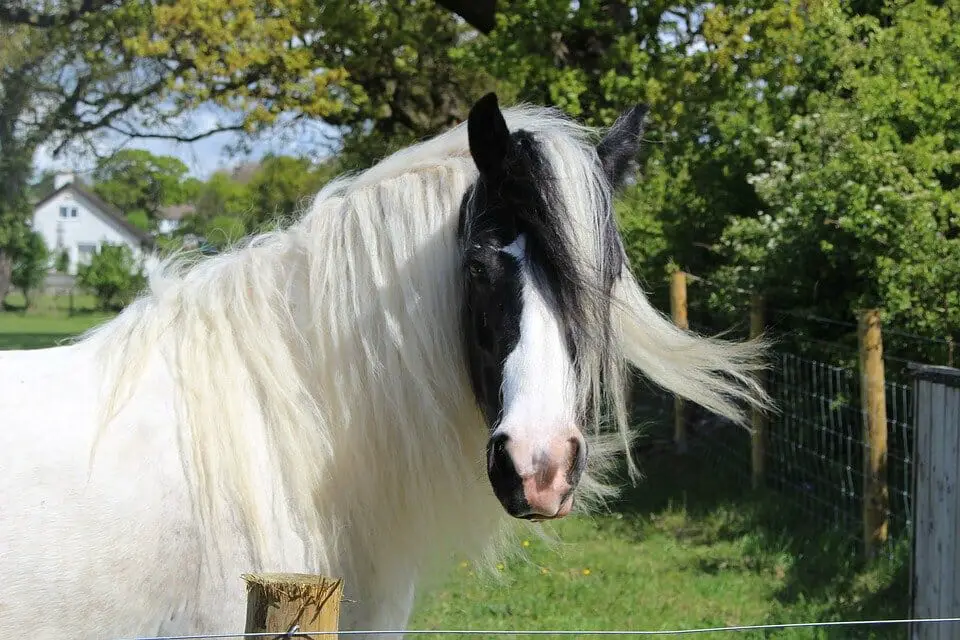
Here is a general weight range in pounds and kilograms of the different horse types. Light horses I am counting as hotblooded and warmblood type horses. Miniature horses are typically smaller than ponies so I put them in a category of their own.
| Horse Type | Weight Range In lbs | Weight Range in kg |
| Light Horses | 800lbs-1500lbs | 363kg-680kg |
| Draft Horses | 1500lbs-2200lbs | 680kg-998kg |
| Ponies | 300lbs-900lbs | 136kg-408kg |
| Miniature Horses | 100lbs-350lbs | 45kg-159kg |
Average Horse Weight Based On Height

This is also a general weight range for horses based on height. Factors which I explained above will determine whether a horse is lighter or heavier for a certain height.
| Height | Weight Range lbs | Weight Range kg |
| 9h | 419lbs- 529lbs | 190kg- 240kg |
| 10h | 529lbs -617lbs | 240kg- 280kg |
| 11h | 529lbs- 705lbs | 240kg- 320kg |
| 12h | 529lbs- 816lbs | 240kg- 370kg |
| 13h | 617lbs- 882lbs | 280kg- 400kg |
| 13.2h | 661lbs- 882lbs | 300kg- 400kg |
| 14h | 794lbs- 992lbs | 360kg- 450kg |
| 14.2h | 882lbs- 992lbs | 400kg- 450kg |
| 15h | 882lbs- 1213lbs | 400kg- 550kg |
| 15.2h | 904lbs-1213lbs | 410kg- 550kg |
| 16h | 1036lbs- 1543lbs | 470kg- 700kg |
| 16.2h | 1080lbs- 1653lbs | 490kg- 750kg |
| 17h | 1213lbs- 1764lbs | 550kg- 800kg |
| 17.2h | 1388lbs- 1984lbs | 630kg- 900kg |
| 18h | 1543lbs- 2293lbs | 700lbs- 1040lbs |
Horse Weight Range Based On Breed
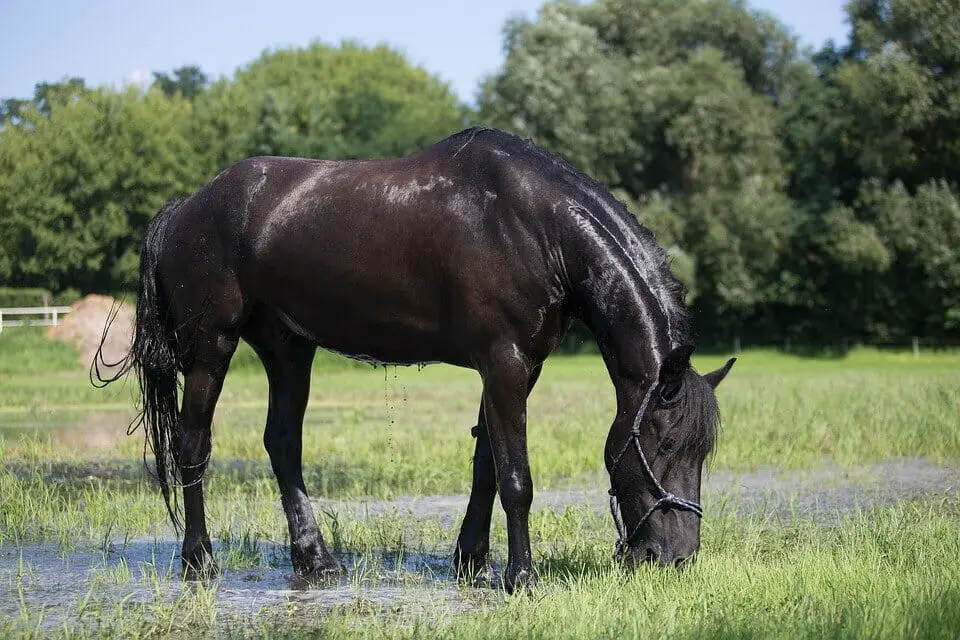
Here is a general list of weight ranges for common horse breeds. Of course there are exceptions for horses weights within a breed. But this will give you an idea of what to expect.
| Breed | Weight Range lbs | Weight Range kg |
| Arabian | 904lbs- 1100lbs | 410kg- 500kg |
| American Quarter Horse | 1000lbs- 1300lbs | 455kg- 590kg |
| Appaloosa | 1000lbs- 1300lbs | 455kg- 590kg |
| Andalusian | 1200lbs- 1300lbs | 545kg- 590kg |
| American Saddlebred | 1000lbs- 1200lbs | 455kg- 545kg |
| Belgian | 1800lbs- 2200lbs | 860kg- 1000kg |
| Clydesdale | 1500lbs- 1700lbs | 725kg- 815kg |
| Cleveland Bay | 1200lbs- 1500lbs | 545kg- 680kg |
| Dutch Warmblood | 1200lbs- 1300lbs | 545kg- 590kg |
| Danish Warmblood | 1200lbs- 1400lbs | 545kg- 645kg |
| Fjord | 880lbs- 1100lbs | 400kg- 500kg |
| Friesian | 1200lbs- 1400lbs | 545kg- 645kg |
| Gypsy Vanner | 1300lbs- 1600lbs | 620kg- 750kg |
| Hackney Horse | 904lbs- 1200lbs | 410kg- 545kg |
| Hanoverian | 1200lbs- 1400lbs | 545kg- 645kg |
| Holsteiner | 1000lbs- 1500lbs | 455kg- 680kg |
| Haflinger | 800lbs- 1300lbs | 362kg- 590kg |
| Irish Draught | 1300lbs- 1500lbs | 590kg- 680kg |
| Lipizzaner | 904lbs- 1200lbs | 410kg- 545kg |
| Lusitano | 900lbs- 1100lbs | 400kg- 500kg |
| Morgan | 900lbs- 1200lbs | 400kg- 545kg |
| Mustang | 800lbs- 1200lbs | 365kg- 545kg |
| Missouri Fox Trotter | 900lbs- 1200lbs | 400kg- 545kg |
| Nakota | 900lbs- 1500lbs | 400kg- 680kg |
| Oldenburg | 1200lbs- 1500lbs | 545kg- 680kg |
| Paso Fino | 1200lbs- 1300lbslbs | 545kg- 590kg |
| Paint | 950lbs- 1200lbs | 430kg- 545kg |
| Percheron | 1900lbs- 2100lbs | 860kg- 955kg |
| Standardbred | 1000lbs- 1320lbs | 455kg- 600kg |
| Shire | 1700lbs- 2700lbs | 770kg- 1225kg |
| Thoroughbred | 1000lbs- 1300lbs | 455kg- 590kg |
| Tennessee Walking Horse | 904lbs- 1377lbs | 410kg- 625kg |
| Trakehner | 1100lbs- 1500lbs | 545kg- 680kg 1 |
| Welskpoloski (Polish Warmblood) | 1100lbs- 1400lbs | 545kg- 645kg |
| Zebra | 850lbs- 1550lbs | 386kg- 700 |
Horse Weight Range Based On Age
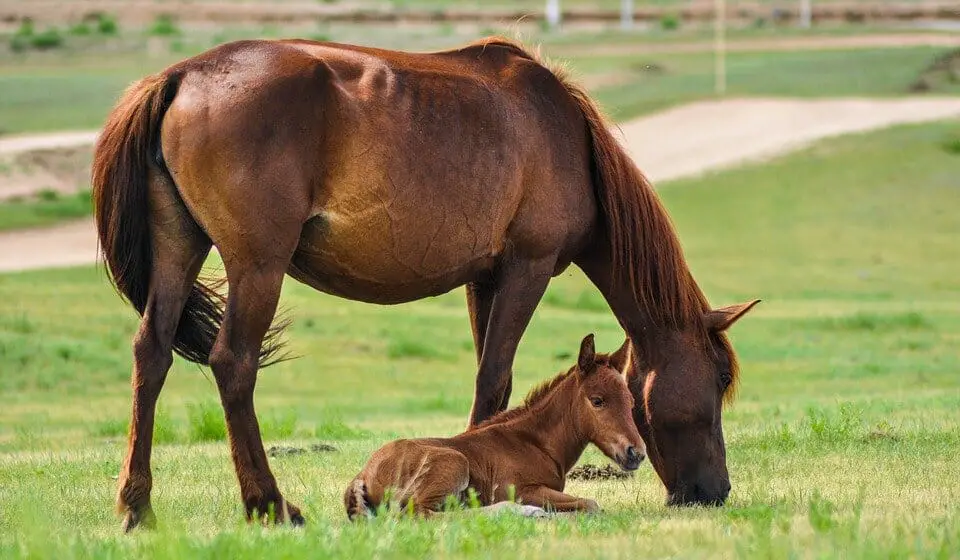
This chart is what to expect for a horse’s weight at different stages starting as a newborn. There are exceptions where horses can grow faster or slower but this is the general standards.
| Age Stage | Weight |
| Newborn | Should weigh roughly 10% of mothers weight at birth |
| Weanling | Foal should be gaining 2-2/5lbs per day. |
| Yearling | 50% of full grown weight |
| 2-Year-Old | 90% of full grown weight |
| 4-Years Old | The last 10% of horses’ weight grows slower and is finished around 4 years old. |
Horse Weight Factors
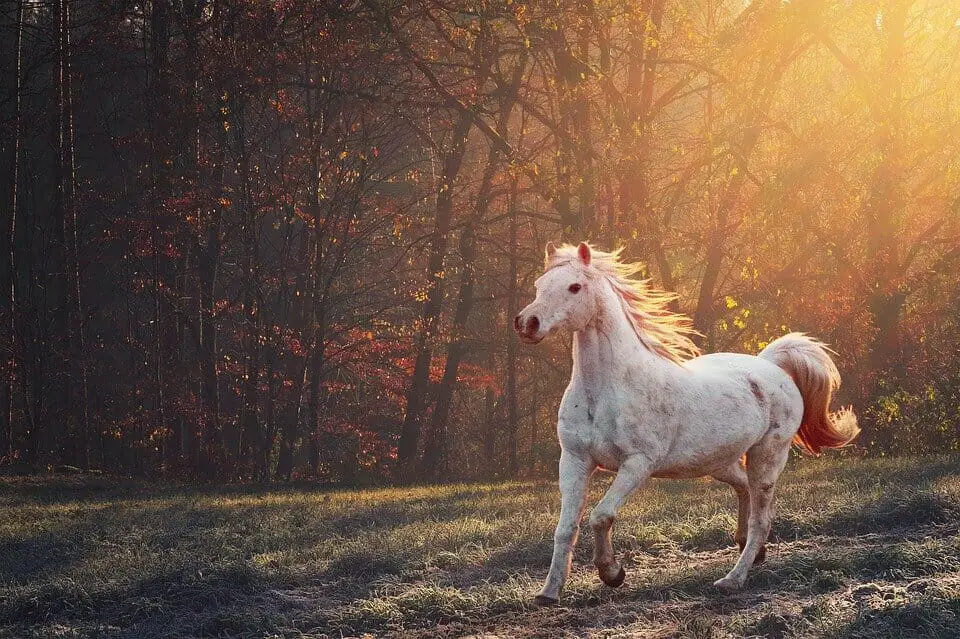
These are a few of the factors that will affect how much a horse weighs.
Height & Width Can Affect Horses Weight
A taller horse typically weighs more than a short horse. Though this is not the only determining factor. You can expect your 16 hand thoroughbred to weigh more than your 10 hand Shetland pony.
A horse of the same height can have different widths. Take a 15.2h quarter horse and 15.2h thoroughbred. I have seen some quarter horses have similar bone density to a light thoroughbred. But say the quarter horse has the same bone density and height but has a wider body. That will add extra weight because there is still more bone and more horse.
Bone density Can Affect Horse’s Weight
Now looking at two horses with the same height and roughly the same width, they can have different bone density. The horse with heavier bone density will typically have thicker legs, bigger hooves, possibly a thicker neck and maybe bigger head. If both horses are at a healthy weight the horse with thicker bone density will typically weigh more.
Muscle & Fat Can Affect Horse’s Weight
As you have heard muscle weighs more than fat. However horses are commonly measured for weight with measuring tape or horse weight tape. So muscle weighing more than fat may not be taken into account when determining a horse’s weight, by the circumference of the horse’s girth.
Why Knowing Your Horse’s Weight Is Important
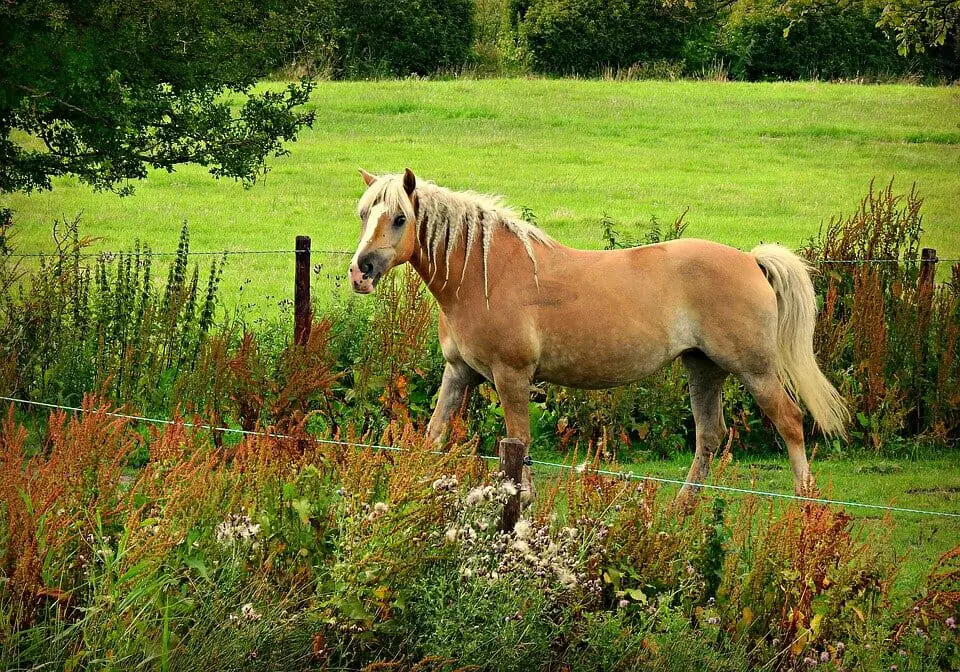
In the beginning of this post I mentioned some reasons why you would want to know a horse’s weight and I am just going to touch on that a little bit here.
Knowing your horse’s weight helps you determine how much weight your horse can comfortably carry.
- Carry capacity is the most amount of weight a horse is okay with carrying based on the horse’s own weight.
- My blog post about ideal horse size goes into much more detail and has charts.
- But basically a horse can carry up to 15-20% of their own weight.
- If a horse carries too much weight the horse is at risk of soreness or injury.
Knowing your horse’s weight helps you determine how much to feed your horse.
- There are other factors to determine the amount of grain along with weight such as age, metabolism, and activity level. Use this calculator to help determine grain type and amount with Purina Feeds.
- Typically horses eat 2-3% of their weight.
- The average horse eats 20-30lbs of hay every day and drinks up to 15 gallons of water.
Figuring out a baseline for your horse’s weight can help you monitor whether your horse is gaining or losing weight.
- However, because horses can bloat, it is more accurate to take pictures.
- Also, judge whether a horse is a healthy weight based on the horse’s body condition score.
- In order for your horse to be a healthy weight, bones should not be showing or sticking out noticeably through the neck, withers, spine, ribs, croup, or tailhead.
- Horse weight can fluctuate with the seasons.
- In the winter horses tend to lose weight as they burn more calories and don’t have access to the additional calories of grass, so they need extra hay.
- In the summer with the plentiful grass around, horses often gain weight, and sometimes horses gain too much. Some horses need muzzles to keep them from over-eating on the grass in the summer.
In order to medicate a horse properly and safely, you want to know your horse’s weight.
- It is not as much of a problem to under-dose but if you overdose certain medications there can be major consequences.
- So make sure you know your horse’s weight before measuring or ask your vet for the correct dosage amount.
If you are trailering horses you want to know the horse’s weights.
- You need to make sure that the truck being driven can safely tow the total weight of the horses and trailer itself.
- Different trailer models also have different carrying capacities.
Determine Healthy Weight With Body Score
Using the body condition score also know as BCS is the best way to determine if your horse is at a healthy weight. The scoring will evaluate how much fat is located in six different areas under your horse’s skin.
The 6 areas to be evaluated are the ribs, back, tail head, behind the shoulders, at the withers and under the neck. The body condition score uses the Kenneke Scale, which ranges from 1 to 9.
Number 1 is a horse that is very underweight, whereas a number 9 means the horse is very obese. It is best for your horse to fall between the 4 to 6 range, with 5 being the ideal.
Heaviest And Lightest Horse Weight
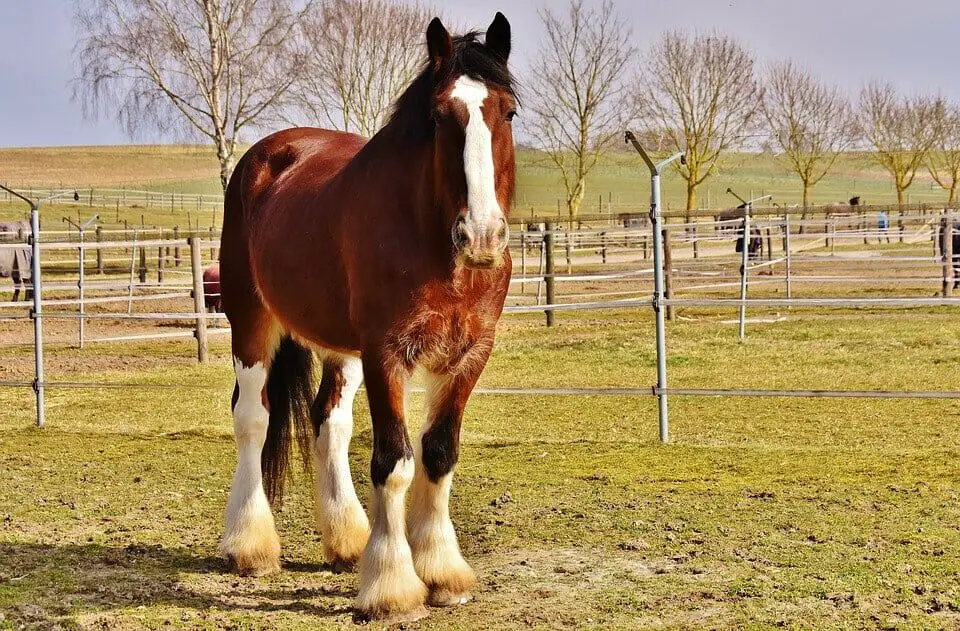
The heaviest horse lived in 1850’s and was a Shire gelding. His name was Sampson but was changed to Mammoth. He weighed a whopping 3,300lbs.
The lightest full grown horse was Thumbelina and lived until 2018. A dwarf miniature horse, she weighed a measly 57lbs.
The current heaviest horse is Big Jake a Belgian draft at 2600lbs.
Einstein is the lightest foal to be born, another dwarf miniature who was 3 pounds lighter than Thumbelina as a foal at 7lbs.
Calculating Horse’s Weight
The heart girth and body length of a horse can be used to estimate the horse’s weight. The equation to calculate a horse’s weight using heart girth (girth) and body length (length) is as follows:
Weight (in pounds) = (Girth^2 * Length) / 330
Here are the steps to measure your horse’s girth and length and calculate its weight:
- Heart Girth Measurement: Use a weight tape or a measuring tape to measure around the horse’s body starting at the base of the withers, going around the widest part of the barrel and the belly, and back up to the base of the withers. This is the horse’s heart girth.
- Body Length Measurement: To measure the body length, measure from the point of the shoulder to the point of the buttock (the furthest rear point where the horse’s hindquarters meet its tail). The tape should follow the curve of the horse’s body.
- Weight Calculation: Once you have the heart girth and body length, plug these measurements into the formula and do the calculations.
For example, let’s say you have a horse with a heart girth of 75 inches and a body length of 70 inches:
Weight = (75^2 * 70) / 330 = (5625 * 70) / 330 = 1195454 / 330 = approximately 1192 pounds
So, the horse in this example weighs approximately 1192 pounds.
This formula provides an estimate, not an exact figure, and is most accurate for average adult horses.
For foals, ponies, draft horses, and other horses that are not of average proportion, there are different formulas and factors to consider.
It’s always best to consult with a veterinarian for the most accurate assessment of a horse’s weight.
Please note that all measurements are to be taken in inches, and the resulting weight is in pounds.
Horse Weight FAQ’s
How heavy is a full grown horse?
A full grown horse weighs 900-2,000 pounds, depending on breed and size. A lean, Arabian, for example, has an average weight of 900-1,000 pounds, while the average Shire weighs in at 1,800-2,500 pounds.
How much should a 16 hand horse weigh?
A 16-hand horse can weigh between 1050 and 1700 pounds, depending on their breed and height. A sixteen hand Trakehners weighs much less than a sixteen hand Percheron. On average, at 16 hands, you can expect a horse to weigh around 1100-1200lbs.
How many pounds is the heaviest horse?
On record the heaviest horse was Sampson, a Shire that weighed 3,300 pounds.
How heavy is a horse in tons?
A ton is 2000lbs. So most horses don’t even weigh 1 ton. That means a 1000lb horse weighs half a ton.
How heavy is a 17 hand horse?
A 17-hand horse can weigh between 1200- 1800 pounds, depending on their breed and height. On average, at 17 hands, you can expect a horse to weigh around 1250lbs-1500lbs
Is it better for a horse to be heavier or lighter?
It is better for horses to be on the lighter than heavier side. More risks and health problems are associated with being overweight such as Cushing’s, founder, and it puts more strain on the horses legs.
Feel free to comment if there is anything else you would like to know about horse weight.
Remember, understanding your horse’s weight is just one part of the larger picture of their overall health and wellbeing. Keep learning, keep growing, and keep riding!
Cheers, Kacey
P.S. Did you find this article informative? Canter over to these other great reads:

